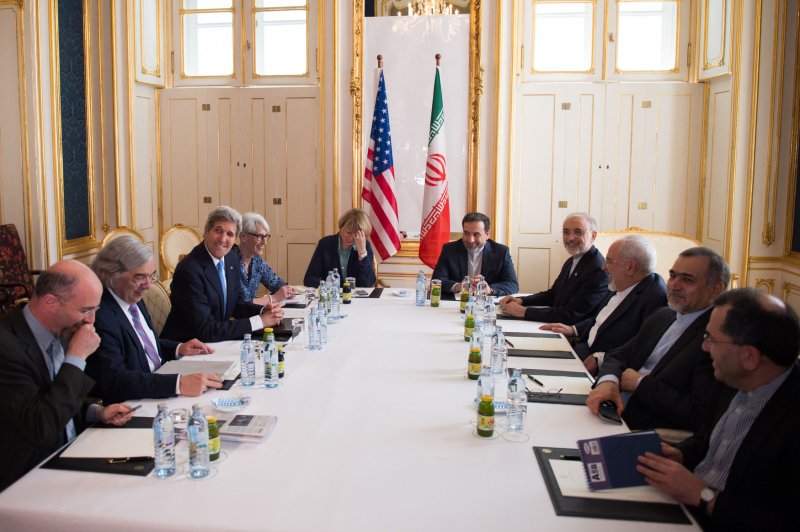U.S. Secretary of State John Kerry, flanked by National Security Council Senior Director for Iran, Iraq, Syria and the Gulf States Robert Malley, U.S. Energy Secretary Dr. Ernest Moniz, Under Secretary of State for Political Affairs Wendy Sherman, and European Union Deputy Secretary General Helga Schmid, addresses reporters as he sits across from Iranian Foreign Minister Javad Zarif, Dr. Ali Akbar Salehi, the Vice President of Iran for Atomic Energy and President of the Atomic Energy Organization of Iran, and other advisers on July 3, 2015 in Vienna, Austria. The talks have reached the critical stage with a third extension to Monday, July 13th. Photo by Ali Mohammadi/UPI |
License Photo
VIENNA, July 13 (UPI) -- The nuclear deal between Iran and six world powers was slowed Monday by a review of the document's wording and discussion of the conventional arms embargo against Iran.
There was optimism in Vienna Monday the agreement would be declared finished after 21 months of negotiation and three extensions of a deadline, but the report, 20 pages of an agreement and 80 pages of appendices listing specific procedures for inspections and other details, remains under review by diplomats from Iran, the United States, Germany, France, Russia, the United Kingdom and China.
At stake is a potentially historic agreement, under which Iran will slow its nuclear ambitions in exchange for lifting of sanctions which have reduced its economy.
A last-minute sticking point involves the wording of a United Nations Security Council regarding Iran's potential to import conventional weapons and missiles. Removal of the current embargo would allow Iran to receive, and spend, billions of dollars in frozen assets, some of which would likely go to the purchase of military equipment China and Russia are eager to sell. The United States has resisted lifting the embargo. It is unclear how the issue will be resolved, but Western officials said over the weekend the negotiations are reaching their end point.
Javad Zarif, the Iranian foreign minister, said in Vienna it was "possible" the negotiations would be concluded by Tuesday. Another member of the Iranian delegation, Alireza Miryousefi, commented on social media Monday, "No one is thinking of another extension (of the deadline). Everyone (is) working hard to get to yes today."
Chinese Foreign Minister Wang Yi, noted, "With intensive consultations in the past couple of days, new progress has been made in the final stage of negotiations. China believes that no agreement could be perfect and conditions are already in place for us to reach a good agreement, hence foreign ministers of the six countries are gathered once again in Vienna to bring the negotiation to its conclusion."
Any agreement would still face a review by the U.S. Congress, which could reject it and maintain the sanctions. President Barack Obama could then veto the deal and send it back to Congress; it would take a two-thirds majority in Congress, considered unlikely, to overturn a veto.















